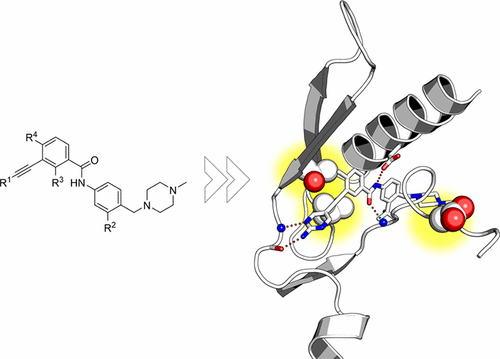当前位置:
X-MOL 学术
›
J. Med. Chem.
›
论文详情
Our official English website, www.x-mol.net, welcomes your
feedback! (Note: you will need to create a separate account there.)
Inhibitors to Overcome Secondary Mutations in the Stem Cell Factor Receptor KIT
Journal of Medicinal Chemistry ( IF 6.8 ) Pub Date : 2017-10-24 00:00:00 , DOI: 10.1021/acs.jmedchem.7b00841 Helena Kaitsiotou 1 , Marina Keul 1 , Julia Hardick 1 , Thomas Mühlenberg 2, 3 , Julia Ketzer 2, 3 , Christiane Ehrt 1 , Jasmin Krüll 1 , Federico Medda 4 , Oliver Koch 1 , Fabrizio Giordanetto 4 , Sebastian Bauer 2, 3 , Daniel Rauh 1
Journal of Medicinal Chemistry ( IF 6.8 ) Pub Date : 2017-10-24 00:00:00 , DOI: 10.1021/acs.jmedchem.7b00841 Helena Kaitsiotou 1 , Marina Keul 1 , Julia Hardick 1 , Thomas Mühlenberg 2, 3 , Julia Ketzer 2, 3 , Christiane Ehrt 1 , Jasmin Krüll 1 , Federico Medda 4 , Oliver Koch 1 , Fabrizio Giordanetto 4 , Sebastian Bauer 2, 3 , Daniel Rauh 1
Affiliation

|
In modern cancer therapy, the use of small organic molecules against receptor tyrosine kinases (RTKs) has been shown to be a valuable strategy. The association of cancer cells with dysregulated signaling pathways linked to RTKs represents a key element in targeted cancer therapies. The tyrosine kinase mast/stem cell growth factor receptor KIT is an example of a clinically relevant RTK. KIT is targeted for cancer therapy in gastrointestinal stromal tumors (GISTs) and chronic myelogenous leukemia (CML). However, acquired resistance mutations within the catalytic domain decrease the efficacy of this strategy and are the most common cause of failed therapy. Here, we present the structure-based design and synthesis of novel type II kinase inhibitors to overcome these mutations in KIT. Biochemical and cellular studies revealed promising molecules for the inhibition of mutated KIT.
中文翻译:

抑制剂克服干细胞因子受体KIT中的继发突变。
在现代癌症治疗中,已证明使用抗受体酪氨酸激酶(RTK)的有机小分子是一种有价值的策略。癌细胞与与RTK连锁的失调的信号通路的关联代表了靶向癌症治疗中的关键要素。酪氨酸激酶肥大/干细胞生长因子受体KIT是临床相关RTK的一个例子。KIT的目标是在胃肠道间质瘤(GIST)和慢性粒细胞性白血病(CML)中进行癌症治疗。但是,在催化域内获得性耐药突变降低了该策略的效力,并且是治疗失败的最常见原因。在这里,我们介绍了新型II型激酶抑制剂的结构化设计和合成,以克服KIT中的这些突变。
更新日期:2017-10-25
中文翻译:

抑制剂克服干细胞因子受体KIT中的继发突变。
在现代癌症治疗中,已证明使用抗受体酪氨酸激酶(RTK)的有机小分子是一种有价值的策略。癌细胞与与RTK连锁的失调的信号通路的关联代表了靶向癌症治疗中的关键要素。酪氨酸激酶肥大/干细胞生长因子受体KIT是临床相关RTK的一个例子。KIT的目标是在胃肠道间质瘤(GIST)和慢性粒细胞性白血病(CML)中进行癌症治疗。但是,在催化域内获得性耐药突变降低了该策略的效力,并且是治疗失败的最常见原因。在这里,我们介绍了新型II型激酶抑制剂的结构化设计和合成,以克服KIT中的这些突变。











































 京公网安备 11010802027423号
京公网安备 11010802027423号